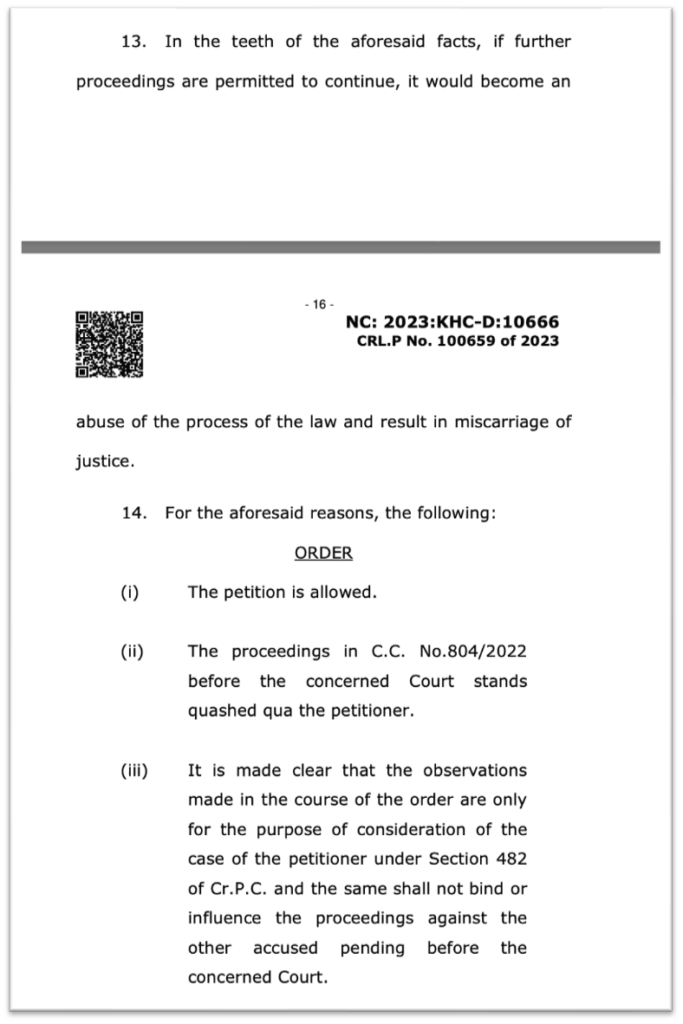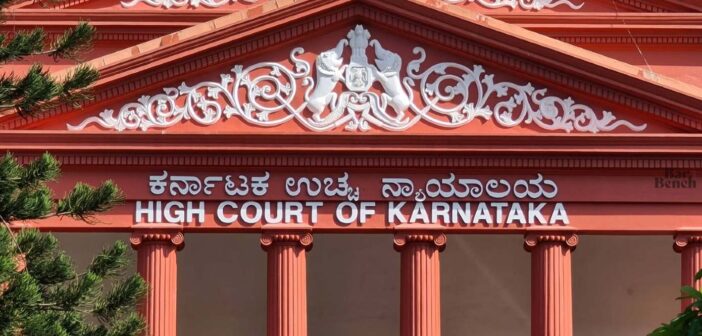In this week’s review of Court Judgments, we look at Supreme Court’s observation that Insurance claims can’t be rejected based on ambiguous term, Allahabad High Court invoking Doctrine of Parens Patrie, Madras High Court’s observation that Employee’s suspension cannot extend endlessly merely due to pendency of criminal cases, Calcutta High Court quashing the case of husband and stating wife can’t be stopped from residing with visually challenged mother and Karnataka High court reiterating that merely being a attesting witness doesn’t make one an accused.
Supreme Court: Insurance claims can’t be rejected based on ambiguous term
While hearing the appeal related to the case, M/S Mehta Jewellers vs. National Insurance Company Ltd. a division bench of the Supreme Court, comprising Justice Hima Kohli and Justice P.S.Narasimha, observed that the claim arising out of an insurance policy cannot be repudiated on the basis of a term in the policy which is itself ambiguous.
The case is related to an insurance policy purchased by one Mehta Jewellers from National Insurance Company Ltd. for insuring ornaments in its showroom in Pune. A burglary took place in 2007, and several of the gold ornaments were stolen. However, the claim for insurance was repudiated stating that the ornaments in the shop at the time of the burglary were kept in a steel safe of local make and not in a burglar-resistant safe.
The appeal in the Supreme Court was filed by the appellant challenging the order of the National Consumer Disputes Redressal Commission wherein it dismissed the claim on the ground that a simple steel almirah cannot be described as a safe and the lock installed is not complex. Prior to that, the appellant challenged the denial of its claim before the State Consumer Disputes Redressal Commission. The Commission ruled in the appellant’s favour and directed the respondent to pay an amount of ₹ 28,95,600/- along with interest.
This order was taken in an appeal by the respondent before the National Commission. The National Commission, in its order, had allowed the appeal. It observed that the almirah could be opened by widening the space between the doors of the almirah. It also noted that in common parlance, a normal steel almirah is not referred to as Safe, which is generally understood to be a strong metal cabinet with a special lock where valuables like money, jewellery, important documents, etc. are kept.
This was challenged in the Supreme Court. The Court allowed the appeal observing that it was unjustified on the part of the respondent to repudiate the claim of the appellant for the sum claimed. It observed that the insurance policy itself does not define the word ‘locked safe’ nor does it define what should be the standard make of the ‘locked safe’.
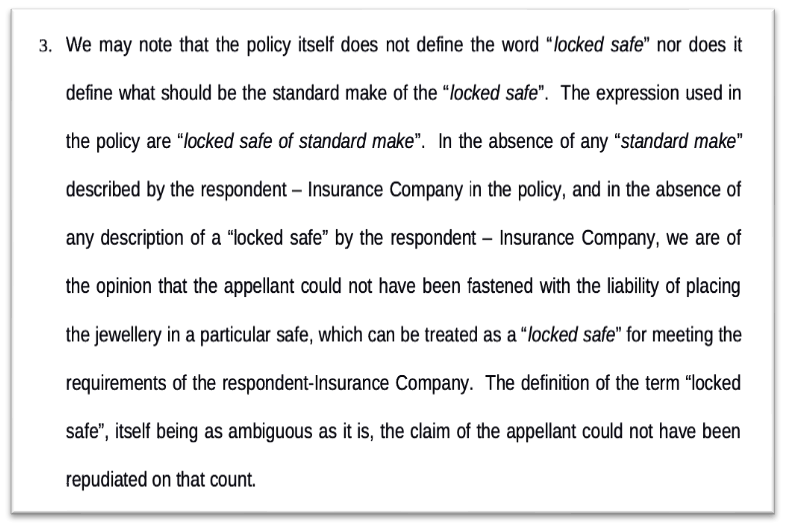
In its judgment, the Supreme Court upheld the amount awarded by the State Commission in favour of the appellant.
Allahabad HC: Invokes Doctrine of Parens Patrie and appoints wife as guardian of husband in comatose.
As per the details of the case, Pooja Sharma vs. State of U.P and others, the petitioner, who is the wife of a person in a comatose state, approached the High Court to be appointed as her husband’s guardian, to enable her to dispose of the property registered in his name.
The wife wanted to sell the property to meet the expenses for her husband’s treatment, who is in a permanent vegetative state due to a head injury. The court has earlier directed the Director, AIIMS to constitute a medical board consisting of specialist doctors dealing with such conditions. As per the report submitted before the court, it was stated that the husband requires prolonged supportive and nursing care and is unlikely to make a significant neurological recovery in the near future.
In view of the condition of the husband who is in a coma and a permanent vegetative state, the question for consideration for the court was to determine who would be the guardian of such a person to handle the property, as there is no provision in the Mental Health Act and Guardians and Wards Act, 1890 for a person in a vegetative state.
The Court observed that although there is a clear distinction between the Rights of Persons with Disabilities Act, 2016, and the Mental Healthcare Act, 2017, however, neither provides for the guardian of a person in a comatose state.
The Court relied on Aruna Ramchandra Shanbaug vs. Union Of India & Ors, wherein the Supreme Court held that a person in minimally conscious state, though not fully coherent, is able to interact shall be governed by the Rights of People with Disabilities Act, 2016.
However, a person in a permanent vegetative state will not be covered within the definition of persons with disabilities and hence excluded from the ambit of the Act. Based on various jurisdictions, the court observed that the doctrine of ‘Parens Patrie”, must be invoked under exceptional circumstances to “meet the ends of justice”, and held that mental incompetency is an exceptional circumstance that justifies the exercise of jurisdiction in invoking the doctrine for appointing guardian.
The Court appointed the petitioner-wife as the guardian of her husband.
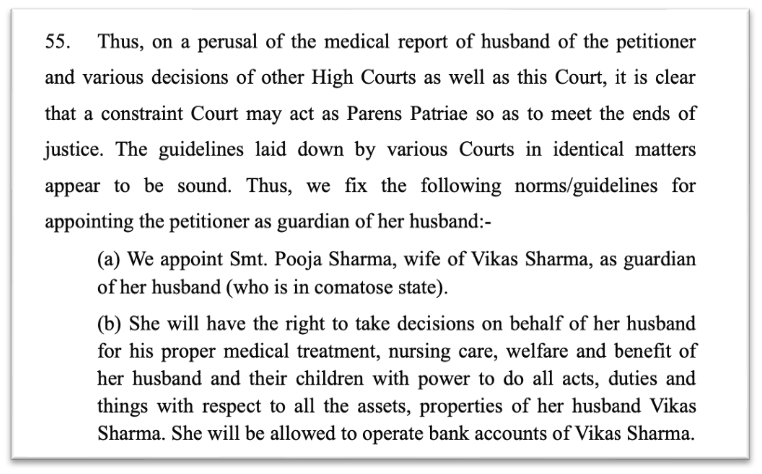
However, the Court also observed any relative or friend of the person in a comatose state pointing that the guardian, is not acting in the best interest of the person lying in a comatose state, can approach the Court for issuance of proper direction and for removal of the guardian.
Madras HC: Employee’s suspension cannot extend endlessly without disciplinary proceedings merely due to pendency of criminal cases.
Two judge bench of Madras High Court consisting of Justice R Suresh Kumar and Justice K Kumaresh Babu, observed that in cases where employees were suspended from service in connection with a crime, the suspension cannot continue endlessly without initiating disciplinary proceedings merely due to the pendency of criminal case.
The observation was made in the case, The Director General of Police vs. D Jayakumar, in which, the employee, who was working as a Special Sub-Inspector in the police department was allegedly caught red-handed for receipt of a bribe by the Vigilance and Anti-Corruption Department and was suspended. His appeal against the suspension order was rejected and the further appeal to the office of the Joint Commissioner of Police was also rejected.
After reviewing the case details, the court noted that in all the rejection orders, the reason given by the authorities for not revoking the suspension was the pendency of criminal cases. The authorities stated that once the case was complete, a decision would be taken. Until such a time, it was not conducive to reinstate the employee.
When the employee approached the High Court, the court directed the State to post the employee in a non-sensitive post. The authorities filed an appeal.
The court dismissed the appeal and noted that the employee was on the verge of his superannuation, before which some decision had to be taken as to whether disciplinary action separately has to be taken against him or otherwise on superannuation and whether the services of the employee has to be retained for the purpose of taking disciplinary action in future. For this purpose, the court felt that it was necessary and inevitable to revoke the suspension of the employee.
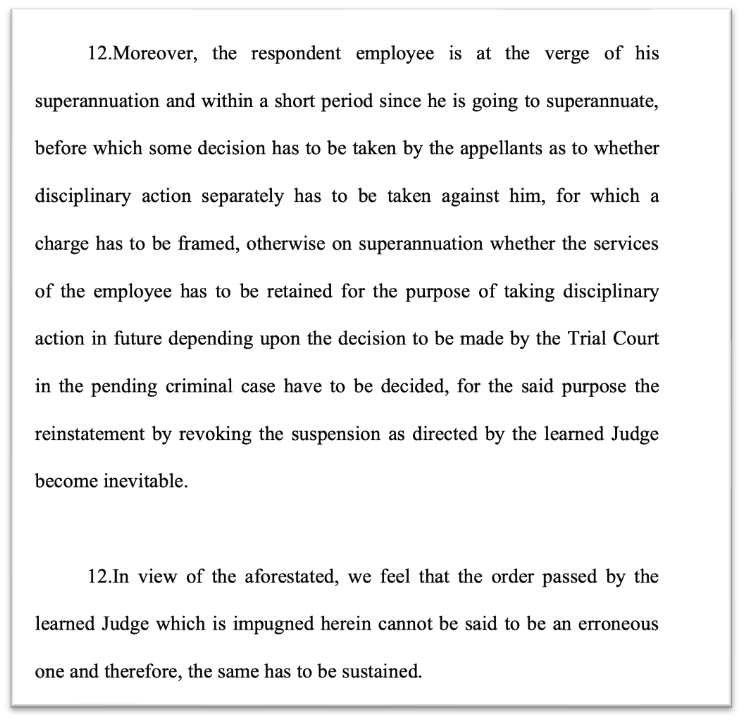
Calcutta HC: Wife can’t be stopped from residing with visually challenged mother and quashes husband’s criminal complaint.
In the case, Sampa Deb (Basu) vs. The State of West Bengal & Anr. a criminal intimidation complaint was lodged by a man against his wife, alleging that she drove him out of her parental home where they used to reside and also beat him up.
The woman was residing with her visually impaired mother, which happens to be in proximity to her workplace. The court looked into factors like – her being the sole breadwinner, her in-laws being deceased, etc.
In the petition filed to quash the complaint, the petitioner argued that her aged mother was 100% blind in both eyes. She was working as a teacher in s primary school, that is located near her parents’ home. She and her husband resided with her mother since 2009, after her husband’s mother passed away.
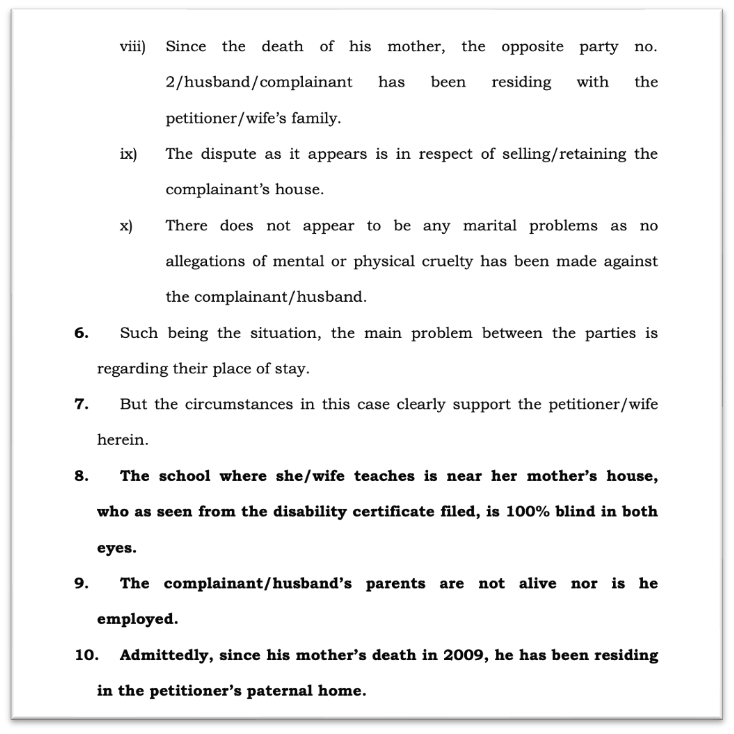
The court noted that the main dispute between the parties was regarding their place of stay, but that the wife’s case was supported by being the sole earning member of the family, with her place of work located near her mother’s residence, who needed her help and support.
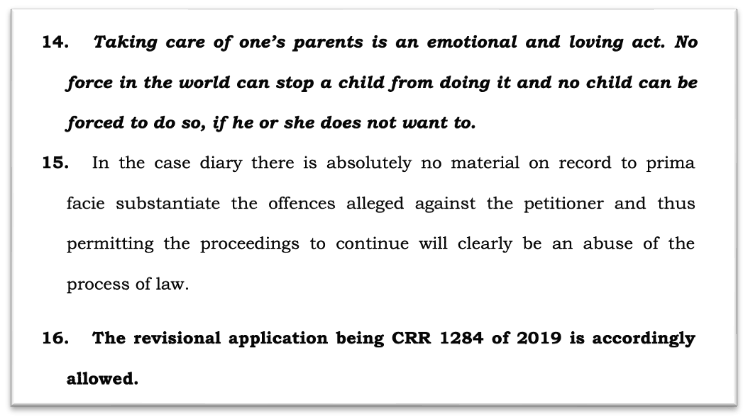
Karnataka HC: Attesting witness to Sale Deed can’t be held criminally liable for cheating in absence of any allegations against them.
In the case, Rajesh Totaganti vs. State of Karnataka & Anr, a single judge bench of Karnataka High Court noted that an attesting witness to a sale deed cannot be dragged into a case of cheating if there is no other allegation against him except that he is an attesting witness.
As per the case details, on 7 October 2015, the second respondent i.e., the complainant filed a private complaint against three accused, with the petitioner being the second accused.
The Magistrate referred the private complaint for investigation, leading to the registration of crime for offences under Sections 420, 465, 467, 468, 471, 474, read with Section 34 of IPC. Subsequently, a charge sheet was filed against the petitioner. The petitioner approached the Court challenging the proceedings initiated against them.
The petitioner argued that the complainant’s allegations are primarily against accused No. 1, who happens to be a relative of the complainant. It was contended that he was neither a beneficiary of any alleged fraud nor someone who purchased property. Instead, he was merely an attesting witness. Therefore, he seeks to have the entire proceedings against him quashed.
This was opposed by the prosecution stating that since the police have filed a charge sheet after the investigation, it is now the petitioner’s responsibility to prove their innocence during the trial.
Going through the records, the court noted that the allegations were primarily against accused no.1 and the petitioner was only an attesting witness to a sale deed. The Court also referred to a Supreme Court case, M. Srikanth vs. State of Telangana and Anr.
The Court concluded that allowing the proceedings against the petitioner to continue would constitute an abuse of legal process and result in a miscarriage of justice. It also clarified that its observations pertain only to the petitioner’s case under Section 482 of Cr.P.C., without affecting the proceedings against the other accused.
